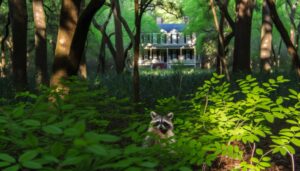How to Legally Own a Raccoon as a Pet
Owning a raccoon as a pet involves significant legal and ethical challenges. Many regions require special permits and adherence to strict housing standards to prevent public health risks and ecological disruption.
Raccoons exhibit complex nocturnal behaviors and require a spacious, enriched environment mimicking their natural habitat. Their diet must be carefully managed to avoid health issues, and regular veterinary check-ups are necessary.
Training is demanding due to their cognitive abilities and natural instincts, posing risks like zoonotic disease transmission. Consideration of these factors is essential for responsible ownership and public safety.
Detailed insights into these aspects will aid your understanding.

Key Takeaways
- Owning a raccoon as a pet is heavily regulated and often requires specific permits.
- Raccoons need a spacious, secure habitat that mimics their natural environment.
- They have complex dietary and health care needs demanding regular veterinary check-ups.
- Raccoons can be aggressive and pose zoonotic disease risks, including rabies.
- Safer and more manageable pets like cats, dogs, and guinea pigs are recommended alternatives.
Legal Considerations
When considering a raccoon as a pet, it is crucial to first investigate the legal requirements and restrictions in your jurisdiction, as many regions have specific regulations governing the ownership of wild animals. These laws are often established to mitigate potential public health risks and ecological impacts.
Certain areas may require permits, adherence to stringent housing standards, and regular veterinary check-ups to guarantee the animal's health and public safety. Additionally, regulations can vary significantly between local, state, and national levels. Non-compliance with these legal mandates can result in penalties, including fines or confiscation of the animal.
Therefore, it is essential for aspiring raccoon owners to thoroughly research and comply with all relevant legalities to responsibly manage the health and well-being of both the animal and the community.
Ethical Implications
The ethical implications of keeping a raccoon as a pet encompass significant concerns related to wildlife conservation and animal welfare. Removing raccoons from their natural habitats can disrupt local ecosystems and contribute to the decline of wild populations.
Moreover, raccoons have complex behavioral and physiological needs that are challenging to meet in a domestic setting, raising serious welfare issues.
Wildlife Conservation Impact
Keeping raccoons as pets poses significant ethical concerns regarding wildlife conservation and the potential disruption of natural ecosystems. Removing raccoons from their native habitats can destabilize local ecological balances, affecting species interactions and biodiversity.
Raccoons play vital roles as both predators and prey, contributing to the health of ecosystems through pest control and seed dispersal. Their domestication can lead to genetic dilution and behavioral changes that may hinder future reintroduction efforts.
Moreover, the illegal pet trade exacerbates these issues, undermining conservation initiatives aimed at preserving raccoon populations. Ethically, it is essential to contemplate the broader ecological implications and prioritize conservation efforts to maintain the integrity of natural habitats and the species that inhabit them.
Animal Welfare Concerns
Beyond the environmental repercussions, domesticating raccoons engenders significant animal welfare concerns, including improper care, stress-induced behaviors, and health complications. These intelligent creatures have complex social and environmental needs that are difficult to meet in a domestic setting. Owners may inadvertently cause harm through inadequate housing, improper diet, and lack of mental stimulation.
Ethically, such practices raise serious questions about our responsibilities toward these animals.
Key concerns include:
- Improper Care: Domestic environments often fail to simulate the natural habitat required for their well-being, leading to physical and psychological distress.
- Stress-Induced Behaviors: Captive raccoons may exhibit aggressive or self-destructive behaviors due to confinement stress.
- Health Complications: Raccoons in captivity are prone to diseases and nutritional deficiencies that can drastically reduce their lifespan.
These factors necessitate a reconsideration of raccoons as pets.
Raccoon Behavior
Raccoons exhibit nocturnal activity patterns, which can present significant challenges for potential pet owners unaccustomed to their nighttime behaviors.
Their social interaction traits are complex, often requiring structured environments to prevent behavioral issues.
Additionally, their inherently curious nature can lead to destructive tendencies if not properly managed, raising concerns regarding home safety and health risks.
Nocturnal Activity Patterns
Prominently, raccoons exhibit pronounced nocturnal activity patterns, which align with their evolutionary adaptations for foraging and predator avoidance. Their heightened night vision, acute sense of smell, and tactile sensitivity facilitate efficient navigation and food acquisition in darkness.
For those considering raccoons as pets, understanding these nocturnal behaviors is important for ensuring their well-being and mitigating potential disruptions to human sleep patterns. Key considerations include:
- Sleep-Wake Cycles: Raccoons' nocturnal nature necessitates adjustments to household routines and environments.
- Health Monitoring: Frequent nocturnal activity can mask signs of illness or distress, requiring vigilant health observations.
- Safety Provisions: Nighttime activity increases risks of injury; secure living spaces and enrichment are essential to their safety.
These insights are essential for fostering a harmonious human-raccoon relationship.
Social Interaction Traits
Understanding the social interaction traits of raccoons is crucial for those considering them as pets, as these behaviors greatly influence their adaptability and integration into human households.
Raccoons exhibit highly social behavior, characterized by complex communication, play, and grooming activities. They form strong bonds with their human caregivers, often demonstrating affectionate behaviors. However, their social nature also includes dominance hierarchies and territorial tendencies, which can present challenges in multi-pet environments.
It is vital to recognize that raccoons are naturally inquisitive and intelligent, requiring ample mental and physical stimulation to prevent behavioral issues. Proper socialization from a young age is critical to ensure they develop into well-adjusted companions. Additionally, health considerations such as zoonotic disease transmission must be meticulously managed.
Curious Nature Challenges
Given their inherently curious nature, raccoons often exhibit behaviors that can pose essential challenges when maintained as household pets. Their inquisitiveness leads them to explore and manipulate their environment rigorously, potentially causing damage and posing health risks.
Understanding these behaviors is vital for anyone considering raccoons as pets:
- Destructive Tendencies: Raccoons can dismantle household items, leading to significant property damage and potential ingestion of hazardous materials.
- Escape Artists: Their dexterous paws enable them to open doors, windows, and cages, increasing the risk of escape and exposure to external dangers.
- Health Concerns: Raccoons are known carriers of zoonotic diseases like rabies and raccoon roundworm, which can be detrimental to human health.
Proper management and precautions are essential to mitigate these challenges.
Habitat Requirements
A raccoon's habitat requirements demand a spacious, secure environment that mimics their natural surroundings to confirm their physical and psychological well-being. This entails creating an enclosure with sufficient vertical space for climbing, as raccoons are arboreal by nature.
The enclosure should be escape-proof and incorporate various enrichment elements such as branches, logs, and hiding spots to stimulate their cognitive functions and alleviate stress. Temperature regulation is essential; raccoons are sensitive to extreme temperatures and require a climate-controlled environment.
Additionally, regular cleaning and maintenance of the habitat are crucial to prevent disease and promote hygiene. Providing such a meticulously designed habitat confirms that raccoons can exhibit natural behaviors, which is necessary for their overall health and longevity.
Dietary Needs
Raccoons' dietary needs encompass a diverse array of foods, requiring a balanced diet rich in proteins, fats, and carbohydrates to guarantee health and vitality. To meet these nutritional demands, it is essential to provide a diet comprised of both animal and plant sources.
Proper dietary planning ensures that raccoons receive essential nutrients and maintain peak health. Key dietary components include:
- Proteins: Sources such as lean meats, eggs, and fish which are important for muscle development and repair.
- Fats: Healthy fats from sources like nuts, seeds, and avocados, aiding in energy provision and brain function.
- Carbohydrates: Fruits, vegetables, and grains that supply necessary fiber and energy.
Adhering to these dietary guidelines will help in nurturing a healthy and thriving pet raccoon.
Health Care
Ensuring a raccoon's overall well-being extends beyond a balanced diet to include thorough health care measures that address both preventive and responsive medical needs.
Regular veterinary check-ups are essential to monitor for zoonotic diseases such as rabies and leptospirosis. Vaccinations should be administered according to a schedule tailored for raccoons, complemented by routine parasite control to prevent infestations by fleas, ticks, and intestinal worms.
Given their susceptibility to various ailments, it is critical to observe for symptoms of respiratory infections, dental issues, and obesity. Engaging with a veterinarian experienced in exotic animals is imperative for accurate diagnosis and treatment.
Training Challenges
Training a raccoon to adapt to domestic life presents unique challenges that stem from their natural behaviors and cognitive capabilities. Raccoons are highly intelligent and curious, making them adept at problem-solving but also prone to behaviors that can be disruptive in a home setting. Understanding these challenges is essential for anyone considering a raccoon as a pet.
Instinctual Behaviors: Raccoons are innate foragers, leading them to rummage through garbage and create messes, posing sanitation and health concerns.
Socialization: Unlike domesticated animals, raccoons require extensive socialization to reduce aggression and anxiety, which can be time-consuming and complex.
Training Limitations: Their cognitive abilities make them difficult to train using traditional methods, requiring customized, consistent behavioral strategies that align with their natural instincts.
Properly addressing these challenges is vital for the welfare of both the raccoon and its human caregivers.
Potential Risks
Owning a raccoon as a pet entails important potential risks, including zoonotic disease transmission, physical harm due to aggressive behaviors, and legal complications arising from wildlife ownership.
Raccoons are known carriers of pathogens such as rabies, leptospirosis, and raccoon roundworm (Baylisascaris procyonis), posing a significant health threat to humans and other animals.
Their unpredictable nature and sharp claws can lead to serious injuries, particularly to children and the elderly.
Additionally, many jurisdictions have stringent regulations regarding the possession of wild animals, potentially resulting in legal ramifications, fines, or confiscation of the animal.
Therefore, it is vital for individuals considering a raccoon as a pet to thoroughly evaluate these risks in the context of public health and safety.
Alternative Pets
Given the substantial risks associated with keeping raccoons as pets, exploring safer and more manageable alternative pets becomes a prudent consideration. Domesticated animals with established care protocols offer significant advantages concerning health and behavioral predictability.
Here are three recommended alternatives:
- Cats: Domesticated for thousands of years, cats are low-maintenance, provide emotional support, and pose minimal health risks.
- Dogs: Highly trainable and diverse in breed-specific traits, dogs can be selected to match various health and lifestyle needs.
- Guinea Pigs: These small mammals offer companionship without the complexities of larger pets, and their care requirements are well-documented.
Choosing these alternatives ensures improved health outcomes and a more manageable relationship, aligning with a commitment to responsible pet ownership.
Conclusion
To wrap up, while raccoons possess unique characteristics that may attract some to contemplate them as pets, the ethical implications, legal constraints, and extensive care requirements present significant challenges.
Can the potential risks and health concerns truly justify the endeavor? Given the complexity of their dietary and habitat needs, coupled with their unpredictable behavior, raccoons are better appreciated in their natural environments.
Alternative pets, which are more compatible with domestic settings, should be pondered for those seeking companionship.






